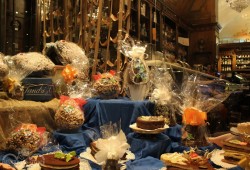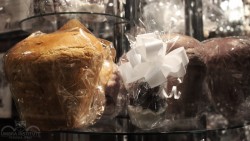How to Celebrate Easter in Italy

Italian culture is one of strong family and religious roots. For this reason, festivities such as Christmas and Easter carry multiple traditions and events. Some of the most popular, among Italians at Umbra, can be found below:
Food, Food, and More Food:

Italians love their food, it is both a science and a delicacy that often leads to bonding among family and friends. Leading up to Easter (during the 40 day period of Lent), Italians often follow the old religious tradition that requires them to give up certain luxuries, such as chocolates or other sweets, and, on Fridays, to not eat meat.
Such gastronomic sacrifice then leads to an Easter feast! On Easter day, Italians have a large breakfast, well, more than just a cappuccino and cornetto. They eat their famous “torta di pasqua al formaggio”, or Easter cheesecake (nothing like American cream cheese-based desserts), along with capocollo, a pork-based meat, boiled eggs, and Ciaramicola (a tasty sweet!). Sometimes, they even add a glass of red wine!

For lunch, Italians often enjoy lamb and lasagna or cappelletti in brodo, followed by a dessert featuring Colomba and giant chocolate Easter eggs. The chocolate eggs come in dark, milk, and white chocolate and almost always contain a special gift. The gift is particularly enjoyable for children but it is not unheard of for a man to hide a ring inside for his future fiancé!
Go to Church:
In the days leading up to the festivities, many Italians “spring clean” their house before inviting a priest over to bless the home. Then, from Holy Thursday through Easter Sunday, the church enjoys a weekend of events in which Italians often partake. On Holy Thursday, Jesus Christ’s last supper is celebrated and a foot washing ritual is often performed, in reference to Biblical events.
On Friday, Italian towns and cities are full of Via Crucis, or a reenactment of what is known as the Passion of the Christ. City streets fill with people dressed in traditional costume, some carry crosses or fire as they march in unison.
Saturday is a day of silence, in regard to many of the festivities. However, on this day, Italians often bring food to be blessed in the church – specifically, the food that will be consumed the following day for Easter breakfast.
Italians then attend Easter mass on either Sunday morning or Saturday afternoon/evening.
Travel and Pasquetta:

Easter Sunday is often spent with family, playing card games, eating nonna’s homemade food, etc. However, Pasquetta, also known as “Lunedì dell’Angelo”, or the Monday after Easter, is a day for travel! Most Italians spend Pasquetta by the seaside, or taking a daytrip to nearby towns, lakes, or hillsides where picnics are common. Italians, young or old, spend Pasquetta with friends, rather than with family.
Special Note: A typical Italian saying for this time of year is “Natale con i tuoi, Pasqua con chi vuoi”, meaning that Christmas is a time to spend with family, and Easter is a time to spend with friends. However, if you ask someone from Puglia, they will often protest that Easter and Christmas are both meant for time with Family, and New Year’s Eve is the holiday for friends.
Each of these traditions may vary by region or family, but they represent the most typical way for Italians to celebrate Easter!
So from the Umbra family to yours, Buona Pasqua!